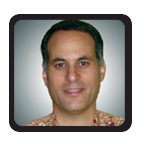 BROADCAST QUALITY
BROADCAST QUALITY
the word on the street
from the people pounding the pavement
by Mary Welch
As we entered the new century, the advertising business was
in a bit of a slump, though it was nothing a little belt-tightening couldn't fix. That all changed when the World Trade towers fell. Corporate America curtailed its marketing efforts and stayed that way for almost two years. Ad agencies as well as post production houses shifted into survival mode waiting for an economic upturn . . . and waiting . . . and waiting . . .
In Atlanta, the post production scene was hit by a double-whammy the aftereffects of 9-11 on the economy in general and the decision by Turner Broadcasting to take the majority of its post production work in-house. Turner's decision, in many cases, reduced some post
production companies' workload by half.

"Everyone here in Atlanta, and really all over the country, hit rock bottom that summer after
9-11 (2002), " says Jennifer Borek Mador, post production manager for Magick Lantern, a
full-service production company. "We were all, not only here, but all production houses all
over town, sitting around twiddling our thumbs and picking up the phone just to make
sure it was still working."
Michael Koepenick, president and senior editor of Guillotine Post, remembers the aftermath of 9-11. "It was brutal, " he said. "It all stopped. We were sitting around wondering what was going on. We all started wearing a few more hats and had longer days. We downsized
a bitand we encouraged people to take vacations. Everything that involved corporate
business completely disappeared."
But, as the saying goes, what doesn't kill you makes you stronger. Sure there were casualties. Companies shut their doors and freelancers left the area looking for more work. Those
companies that stayed in business and a daring few who thumbed their nose at the
economy and hung out a new shingle have not only survived but are indeed more
compettive and getting more business.

Crawford Communications is the largest post production facility in the Southeast with 270 employees and 120 "resident clients" who rent space and work, says Bill Thompson, vice president. "Looking back at the recent unpleasantness that ended last year, I see companies, like ourselves are re-inventing ourselves.
We no longer are resting on our laurels. The bad economy takes the wind out of everything. It burns everyone out. But the general impression is that the economy is getting better and it has legs. There will be more sunny days and we're all feeling a little more secure in the fact that business is coming back."That philosophy allows companies like Crawford to "not worry so much and focus on what we do best."
So exactly what is going on in Atlanta's post production world? It turns out plenty. For one thing, the city has become a Mecca for post production work for cable networks. Crawford, which has seen a lot of economic ups and downs since forming as a boutique in 1981 with one editing suite, says that 60 percent of its business is cable television satellite-related with 40 percent being the more traditional post production work. Crawford
was one of the first local companies to work with Turner and in the late 80's, and Turner became Crawford's largest client. The experience paid off.
Today 34 cable television
networks, such as the
Discovery Channel, the Travel Channel and the
Learning Channel,
originate from Crawford where they are uplinked
to satellite.
"It's something that started slowly in the mid-80's, " Thompson said. "And, then it just snowballed.
It requires a certain expertise and it's really where all our business growth has come from other the years." Work with the cable companies is "more recession proof, " he added.
Guillotine has also found success in the cable industry, particularly the Disney Channel. The company recently
finished 18 public service announcements from ABC/Disney Channel's "Learning Together, " which encourages
kids to read. Done on a limited budget and shot in 16 mm and 35 mm, the spots featured the stars from Disney's "Lizzie McGuire" and "That's So Raven." In keeping with a lean budget, half of the music was written by Koepenick and recorded by him and his former band. "Since our corporate work completely disappeared, we've been able to get a good amount of broadcast work andthey've been consistent clients, " Koepenick said. "And that has made all the difference."
At Magick Lantern, they are finding a lot of work is still available at Turner. "We decided to stay within the Turner family and we get a majority of overflow work, " Borek Mador says. "We really want the work to stay in Atlanta. Turner is still huge and provides us with
substantial revenues."
Borek Mador admits that the relationship with Turner often involves
a third entity. "It's very difficult competing with work being done overseas, " she says. "We will partner with Turner to do the editing
at Magick Lantern and the graphics in Argentina, where it is so
much cheaper.

Keith Adams at Spin Productions has expanded his portfolio to include episodic television work. His company makes the blasts come out of the guns on "Stargate: Atlantis" as well as other finished special effects work. Adams says Spin, which has offices in Vancouver, Toronto and Los Angeles, spreads the work among the four outposts. " Stargate' is shot in Vancouver, so we benefit from the relationship our Vancouver office has. We're getting a huge quantity of work and doing some very big jobs. What's nice is that it's more focused production work where we do three or four jobs for the same amount of money that we used to get from 20 jobs."

LAB 601 Digital Post is a full-service digital post production facility
providing an integrated video and audio workflow from pre-
production to the final edit and mix. While they have clients in
the advertising, broadcast network and corporate worlds, they are also making a name for themselves in the motion picture industry. Opened in 1999, LAB 601 has become a favorite of independent filmmakers "one of our biggest customers, " says Peter Ballard. "We decided to get into editing independent films, not only for the notoriety, but also we were honing our skills in the processes."
Ballard notes that a $200, 000 independent film brings in as much profit as 25 television commercials. The company recently edited and did the special effects for the independent film, "The Last Goodbye, " which debuted at the Tribecca Film Festival in New York. "There is enough pockets of talent in Atlanta to bring Hollywood
productions here and handle them from start to finish. Each film done here, in a sense,
helps build the business a little more."
Like others in the Georgia production industry, Ballard says that the state legislature's decision not to grant incentives to companies filming here or to offer sales tax incentives and investment tax credits is hurting the state's entire post production and film world. "It doesn't help us build the business here and we would have taken advantage of the investment tax credits to
purchase new equipment. It would have created more jobs and brought better jobs to the state faster as well as helped growing our own Georgia film industry, "
he said.
Another setback for the local industry was the inability to establish an Atlanta chapter of the Association of
Independent Commercial Editors. "We tried to start at chapter but it fizzled, " he said. "There was a lack of
leadership. It's a powerful organization and every
other major market has one, " Ballard says. "A chapter would be a stamp of approval on the city and its talent
and it would have collectively improved everyone's game as well as their business."
In addition to catering to new types of business sectors, Atlanta's post production companies have gone
outside the city looking for business, facing the price issue and spending some downtime honing their skills.
Over the past couple of years, Spin has broadened its reach into New York, Chicago, Los Angeles and other
markets, Adams says. Crawford made a concerted effort to become a force in the secondary markets, such
as South Carolina, Nashville, Birmingham, Richmond, Mississippi and Ohio. "We started a strong business
initiative in Washington D.C. and really constantly called on all the regional markets, " said Thompson. "There
are still people making commercials and videos.
We wanted them to think of us during the
economic downturn."
Of course, as the market tightens and companies invade new territories, the issue of price inevitably comes up. "Pricing became more competitive, " Thompson admitted. "But we weren't going to let budget be an obstacle. We want to be flexible. Some clients are more interested in price but we think that a lot of clients still want the total package the best technology, the best creative talent and the best client service. It's a challenge."
Ballard points out that it was easier to spot exactly what clients wanted in terms of budgets.
"We know the value of our services
and you get what you pay for, " he says. "But there are a lot of clients where price is what they're looking for.
It doesn't make sense for them to pay a premium price because they don't need that. We don't sell
on price. We sell on value."
At Spin Productions, the economy is picking up and so are the budgets. "We're seeing bigger
budgets, " admits Adams. "The budgets had been so low that taking them was really to our detriment.
We tried to avoid that but sometimes we would take the work just to build a relationship and keep our people working."
Over on the technology side, Jim Wile, president and owner of Comprehensive Technical Group Inc., which sells equipment to post production facilities, is seeing a trend to very high-end equipment as well as the low end. "High definition is definitely becoming a driving force, " he said. "We've sold a fair amount. People are embracing high definition as a product. They are seeing that if they have strong talent and the
equipment, they can attract the business."
Wile says that Turner's early acceptance of high definition has given a number of local talent as well as
production houses experience in the latest cutting edge technology. On the flip side, however, Wile says, "we're also seeing more no-frills, back to basic, value-conscious products being sold. It's becoming a
polarized market with some companies having the more powerful tools and others with the low-end equipment. There are less middle-of-the-road places."
Wile, who has recently added staff, now has 42 persons on board. Part of his expansion has to do with the economic downturn, as more companies are not buying new equipment but are instead holding on to it and getting it repaired as needed. Wile's company not only sells equipment but services it as well. Sony recently shut its local service center and Comprehensive Technical Group has picked up that business. "There's more money to service and fix something than to buy new or upgrade, " he says.
What may be particularly intriguing is that with the downtime, Atlanta's production houses may have rediscovered the passion for the business and the reason they started in the first place. Keith Adams says that his company decided to focus on giving clients a "more focused" approach. "We're not doing 20 jobs. We're doing maybe three to four and we have a group of resources and artists who will concentrate on the job." He says that clients are coming to him after discovering that the work done in New York or Los Angeles " . . . might have the same look or effect. They're not pushed o try something else. We want to be on the cutting edge of design. In Atlanta there are fewer of us so we can try different things. We are pulled and driven to do different effects. We want to be challenged instead of doing it the traditional way.
Part of the fun is having a client coming to us with a budget and an idea and us finding the best effort
for that budget. It makes it very interesting."

Guillotine's Koepenick notes that many of the production houses that "were out to make a quick buck are all out of business." Instead, his company is "trying to keep people happy. We're looking for organic growth with clients we already have." Crawford's Thompson knows that technology is driving costs down but they firmly stand behind their value-added belief. "In the near past, technology was driving a lot of the work but we believe that if you give good client service and support as well as creative talent, you'll do fine. You have to bring something to the party. It's a collaborative effort. We still like to think it's about ideas and finding the best solution for a client."
LAB 601 was founded in 1999 because "we felt there was a need for high quality service as well as savvy technology. It's about over-the-top customer service. It's about creating value for the customer, " Ballard said.The issue that is still unresolved is the relationship between the talent and the equipment. It's almost a chicken-and-an-egg situation.
Does the effort work because of the idea and the talent or is it a machine and software driven approach. Jim Kanter, a cinematographer and filmmaker, decided there was more work in training people in the post production machines than in actual production work so he started Digital Film Institute. He is certified to teach Adobe, Apple and Boris editing programs.
 "The demand was growing, " he says. "You have an increase in sophistication in the equipment and a decrease in the cost of using
the equipment. You've got a lot of kids who know how to use it and are still living with theirfolks so they are driving the
prices way, way down."
"The demand was growing, " he says. "You have an increase in sophistication in the equipment and a decrease in the cost of using
the equipment. You've got a lot of kids who know how to use it and are still living with theirfolks so they are driving the
prices way, way down."
The downside is that while the costs are being lowered, the quality of the work is also going down. "These kids just aren't good with much beyond using the equipment. A lot is built into the systems but that doesn't mean that doesn't mean that you'll get compellingwork. They don't have ideas or know what to do to help the client. And, a lot of clients don't know the difference."Kanter caters to the professionals, either one-on-one, in a classroom or a studio. "I upgrade my equipment every year. I'm getting a lot of veterans in the business that used to have one specialized skill that clients would go to them for. But now, that's not happening so they need to
diversify. A lot of my clients just need to know the latest application and they need to know it now." Kanter asserts that training
brings a competitive advantage. Several representatives from post production houses said that their staff trained on new
equipment during the recent downturn.
"Today, ideas are more important, " said Crawford's Thompson. "In the past
technology may have driven the process because it was cost-effective but now
it's ideas. We've spent money on upgrading our equipment and new equipment.
We're hiring talent. And, we truly recognize the value that we bring to a client."
Magick Lantern kept all of its staff trained on the latest software. "We wanted to stay fresh so that when the economy started getting
better, we'd be ready, " says Borek Mador. "We expanded our training and got the latest equipment. We are ready."
Overall, it seems that business is picking up whether it's from new location, different market segments or old clients wanting to do new things. The corporate business still seems a bit soft. Companies aren't having as many big meetings and those that have them are opting for a more low-key approach. A lot of training is now done on the computer so the corporate business may not be as lucrative
as it once was. Corporate videos used to be a steady part of Guillotine's business. "We used to count on it, " Koepenick says. "But corporations are now using web sites and the video isn't the answer to all the questions or problems anymore. That's why it is so important
for a post production company not to have their eggs in any one basket. Diversification is the key to staying in business."
Regardless of exactly where the business is coming from, it does seem as though it is coming back to Atlanta.
"We're even starting to see some corporate dollars flowing again. I don't think the climate and the outlook has been this good, " Thompson says, "since before 9-11."



